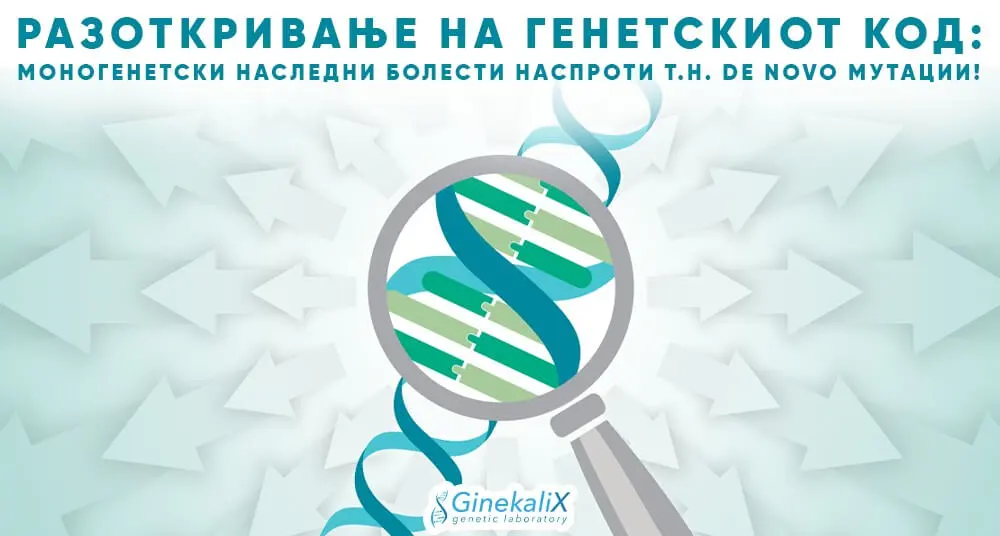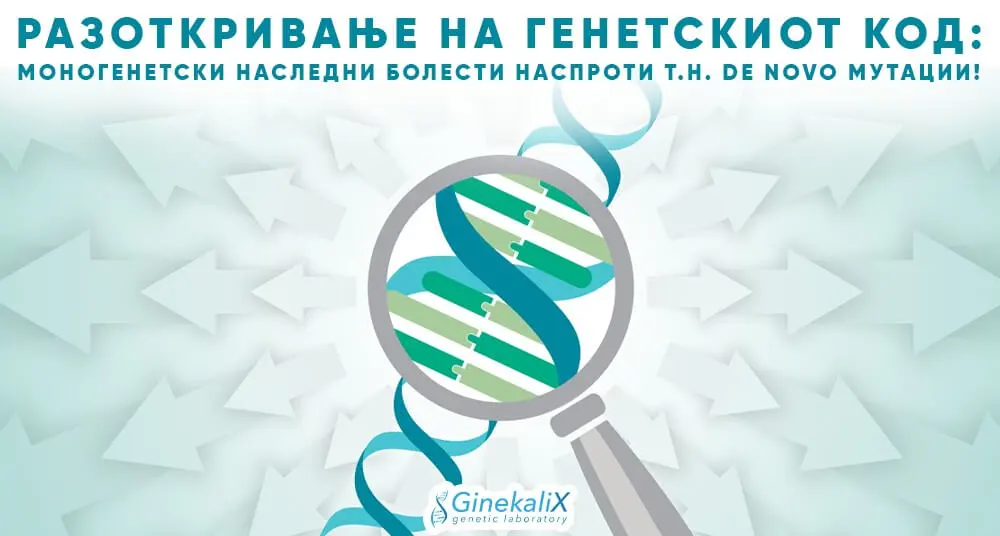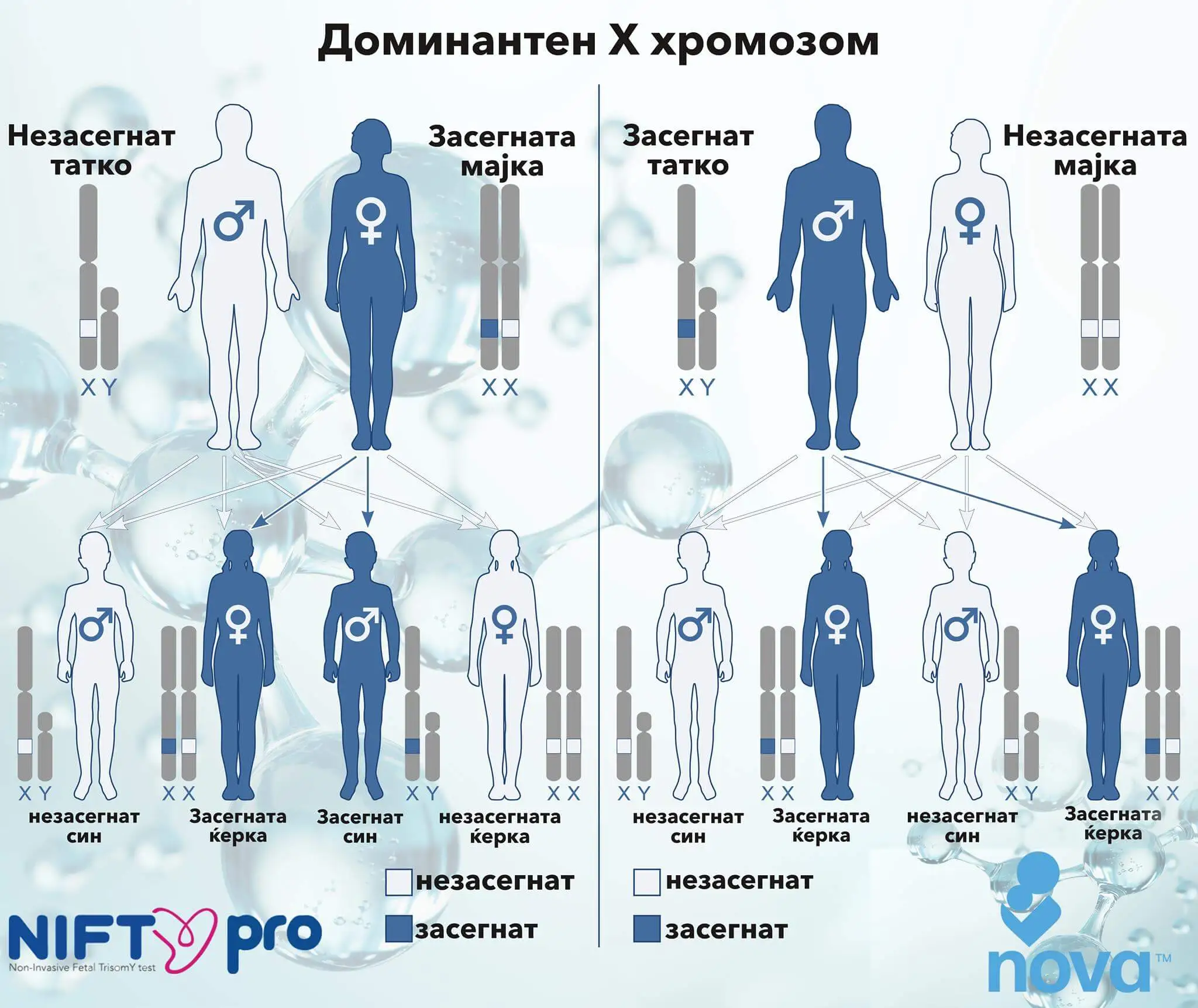Unraveling the Genetic Code: A Guide to Monogenetic Diseases

Genetics, the blueprint of life itself, contains an abundance of mysteries waiting to be discovered. Genetic mysteries are both fascinating and complex, shaping the very essence of our being. Genetic disorders have long been the subject of fascination and concern for many because they are complex puzzles, with each piece representing a unique aspect of our genetic makeup.
Decoding genetic variation
Two significant "culprits" for these puzzles are monogenetic diseases and the so-called. de novo mutations, each with distinct characteristics and implications. Monogenetic diseases and de novo mutations are related concepts in genetics, but they refer to different aspects of genetic disorders. Let's look at the differences between these two genetic phenomena and understand their impact on individuals and families.
Monogenetic diseases versus de novo mutations
Monogenetic diseases: a family story
Monogenetic diseases, also known as Mendelian diseases, are caused by mutations in a single gene. Huntington's disease and cystic fibrosis fall into this category.
- Inheritance: These diseases are usually inherited from one or both parents who carry the mutated gene. They follow specific patterns of inheritance, such as autosomal dominant (only one mutated copy of the gene is necessary for the disease to occur) or autosomal recessive (two mutated copies are needed). Understanding these patterns is critical to assessing risk in families and providing genetic counseling.
- Examples: cystic fibrosis, Huntington's disease, and sickle cell disease are examples of monogenetic diseases.

De novo mutations: spontaneous genetic surprises
On the other hand, de novo mutations are genetic changes that occur for the first time in a family and are not inherited from either parent. These mutations can occur in the germ cells (sperm or egg cells) of one parent or in the early stages of development from an embryo. De novo mutations can lead to a variety of genetic conditions, often causing rare and unique disorders that may have no previous family history. These spontaneous genetic changes play a significant role in our understanding of genetic diversity and the complexity of human genetics.
- Occurrence: De novo mutations are relatively common and can occur in any gene. They are a significant cause of various genetic disorders, especially in individuals without a family history of the disease.
- Impact: Depending on the specific gene affected, de novo mutations can lead to a wide range of genetic conditions, including intellectual disabilities, developmental disorders, and certain cancers.
Inheritance patterns
Monogenetic diseases are caused by mutations in a single gene and can be inherited from parents, following specific patterns. De novo mutations, on the other hand, are genetic changes that occur spontaneously and are not inherited, making them the cause of genetic disorders in individuals with no family history of the condition.
There are several common patterns of inheritance for monogenetic diseases depending on whether the mutation is dominant or recessive. Here's an overview of the most common inheritance patterns:
| Inheritance pattern | Description | Hemophilia |
| Autosomal dominant | A single mutated gene copy causes the disease. | Huntington's disease |
| Autosomal recessive | The disease requires two mutated gene copies. | Cystic fibrosis |
| X-linked dominant | The mutation of the gene on the X-chromosome leads to the disease. | Rett syndrome |
| X-linked recessive | A mutation of the gene on the X chromosome requires two copies for males and one for females. | Hemophilia |

Understanding these patterns is essential for genetic counseling and predicting the risk of passing the condition on in families.
Strengthening knowledge
Understanding the differences between monogenetic diseases and de novo mutations is essential for both medical professionals and the general public. Knowledge of monogenetic diseases and their inheritance patterns enables individuals to make informed decisions about their health and family planning. In the ever-evolving field of genetics, unraveling the mysteries of monogenetic diseases brings us one step closer to personalized medicine and effective treatments.
Genetic testing and counseling play a key role in identifying these genetic variations, offering valuable insights to affected individuals and their families and understanding the implications for future generations. Empowered with knowledge, individuals can make informed decisions about their health and family planning, fostering a supportive environment for those facing genetic challenges.
This table provides an overview of some of the most common monogenetic diseases. Please note that prevalence rates and affected genes may vary based on different populations and geographic areas.
| Illness | Inheritance pattern | Prevalence | Affected gen |
| Huntington's disease | Autosomal dominant | 5-10 cases per 100,000 people worldwide | HTT gen |
| Cystic fibrosis | Autosomal recessive | 1 in 2,500-3,500 white children | CFTR gene |
| Sickle cell anemia | Autosomal recessive | 1 in 500 black children | HBB gen |
| Thalassemia | Autosomal recessive | It varies depending on the region and population | HBB and other genes |
| Hemochromatosis | Autosomal recessive | 1 in 200-400 people of Northern European origin | HFE gen |
| Phenylketonuria (PKU) | Autosomal recessive | 1 in 10,000-15,000 US births | PAH gen |
| Duchenne muscular dystrophy | X-linked recessive | 1 in 3,500 male births | DMD gen |
| Fragile X chromosome syndrome | X-linked recessive | 1 in 4,000 men, 1 in 6,000-8,000 women | FMR1 gene |
| Marfan syndrome | Autosomal dominant | 1 in 5,000-10,000 individuals worldwide | FBN1 gene |
| Neurofibromatosis Type 1 | Autosomal dominant | 1 in 3,000 births worldwide | NF1 gene |
As we continue to unravel the mysteries of our genetic makeup, knowledge of the diversity of genetic variation, from inherited mutations to spontaneous genetic surprises, is key to advancing medical research and personalized healthcare. By embracing knowledge and fostering understanding, we can navigate the complexities of genetic disorders, paving the way for a healthier future for all. By raising awareness and fostering understanding, we can support affected individuals and their families while advancing research and healthcare practices. Remember, knowledge is a powerful tool in our journey to a healthier life. Stay curious, stay informed, and let's decode the genetic wonders together!
Note: This article provides general information and should not be considered medical advice. Consult a healthcare professional for personalized guidance on genetic conditions and testing.
Tags: genetics, monogenetic diseases, de novo mutations, genetic enhancement, health, research, genetic research, inherited conditions, genetic counseling
Keywords: monogenetic diseases, de novo mutations, patterns of genetic inheritance, Mendelian disorders, genetic counseling, genomic research, inherited genetic conditions, spontaneous genetic mutations, genetic diversity, personalized medicine
